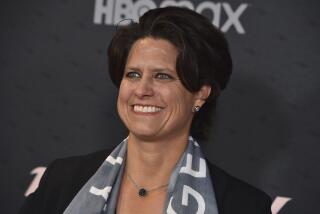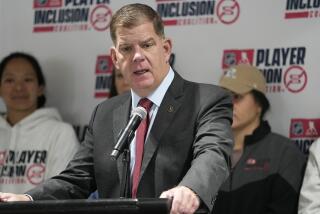Questions on Quinn Lingering : How to Proceed Next Seems Unclear; NHL Corrects Statement
- Share via
MONTREAL — The more light that is shed on the National Hockey League’s unprecedented penalties to all parties in Pat Quinn’s conflict-of-interest case, the less the facts seem to come to light.
The case was confusing enough before NHL President John Ziegler issued his 21-page decision Friday. In that document, Ziegler outlined the sanctions taken against the Kings, the Vancouver Canucks and Quinn: The Canucks were fined $310,000, the Kings were fined $130,000 and Quinn’s expulsion from hockey was extended through the end of this season.
Ziegler originally expelled Quinn on Jan. 9 after discovering that the Kings’ coach, who is in the last year of a three-year contract with the team, had signed a contract Dec. 24 to become Vancouver’s general manager and president after this season. The Canucks also paid Quinn a $100,000 signing bonus.
In handing down one of the more monumental decisions in its 70-year history, the NHL made an error in the statement it released to the media, and the error resulted in confusing and conflicting reports regarding the expulsion of Quinn.
As reported in The Times Saturday, the decision from Ziegler specifically barred Quinn from “performing any coaching duties for Vancouver” until the 1990-91 season, apparently leaving Quinn the option of coaching elsewhere next season if he chooses.
However, the two-page press release, written by the NHL’s public relations department in New York, said incorrectly that Quinn was suspended from coaching in the entire NHL until the start of the 1990-91 season. That statement was released to the U.S. and Canadian media Friday evening.
Since many reporters did not have access to Ziegler’s full decision, they reported what was in the press release, leaving the impression in many cities that Quinn was banned from coaching until 1990.
Apparently, the league was unaware of the discrepancy until a reporter called league officials Saturday asking for a clarification.
From the King-Canadien game here Saturday night, Ziegler acknowledged the mistake and confirmed that his ruling states only that Quinn may not coach for the Canucks.
The NHL quickly drafted a brief press release, correcting their first one.
Ziegler held an impromptu press conference between the first and second periods here. But his answers did little to explain what may happen next in the case.
The unsettled sense of the matter was expressed from all the principals Friday night. Among their questions: What are the league’s policies or by-laws regarding appeals? When and how are the fines to be paid? Is there a precedent for this kind of situation?
“We really don’t know at this time all the avenues open to us--we’re trying to find out,” said Bob Steiner, a spokesman for King majority owner Jerry Buss.
Likewise, Quinn, who is a semester away from a law degree, was baffled by the ruling and unsure of the procedural channels. His attorney, Morris Chucas, said he is aware of an appeals process but is unclear about the details.
Ziegler bristled at questions that focused on the rules under which the league operates (the NHL considers that its constitution and bylaws are confidential). He did, however, confirm that the Kings, the Canucks and Quinn have at least two options for redress within the league.
The first is to appeal to the NHL’s board of governors. Under this option, each party must submit to Ziegler a written request to be added to the agenda at the next board meeting. The request must be submitted within 10 days of the Jan. 30 ruling, and Ziegler said it will automatically be forwarded to the board.
The next meeting is in two weeks at Quebec City, where the two All-Star games with the Soviets will be played.
The board is an independent entity that may “confirm, amend or quash” Ziegler’s decision and may “confirm or mitigate the penalty imposed.”
The Kings would be the likely winners at such a hearing. They could request that the board require the Canucks to compensate them for the loss of their coach at the middle of the season.
Because, at Quinn’s request, his contract with the Kings was not on file with the league, the Kings may not charge Vancouver with tampering. Although the league requires that a notice of employment be filed in the case of player contracts, it has no similar requirement for nonplaying personnel. Ziegler would not comment if these rules might be changed as a result of the Quinn case.
Ziegler said he could not remember what previous matters have come before the board nor how many times the board has reversed a president’s decision.
The second outlet is a request for rehearing, which also requires a written application to Ziegler. This is a chance for the teams to recover all or part of the fines levied.
Under Ziegler’s order, $15,000 of the fine to the Kings and $60,000 of the fine to the Canucks is payable immediately, while the balance is payable June 11.
This was first interpreted as meaning that if, in the rehearing, it was decided that the fines should be rescinded, the teams would not have to pay the balance, or about 90%.
Ziegler would not clarify the point but said: “Fines are fines--the money is owed.”
He would also not comment on an interesting stipulation regarding the rehearing procedure: If the Canucks and Quinn want to apply for a rehearing, they must first get approval from the Kings.
A similar application from the Kings however, requires no such endorsement from either the Canucks or Quinn.
Ziegler was also asked if, in assessing the maximum fines allowed to him, there was significant deterrent to stop another team or coach from doing just what the Canucks and Quinn did.
“How can you tell people not to act?” Ziegler said. “It happens every day in our lives. There is a death penalty, and it doesn’t prevent crime.”
However, there are still no NHL rules preventing a similar situation from happening again. In a competitive league like the NHL, it is possible that some team would be willing to absorb the cost of a fine in order to achieve a higher goal--winning.
“Hopefully, there are lessons to be learned here,” Ziegler said. “For everyone.”
More to Read
Go beyond the scoreboard
Get the latest on L.A.'s teams in the daily Sports Report newsletter.
You may occasionally receive promotional content from the Los Angeles Times.







